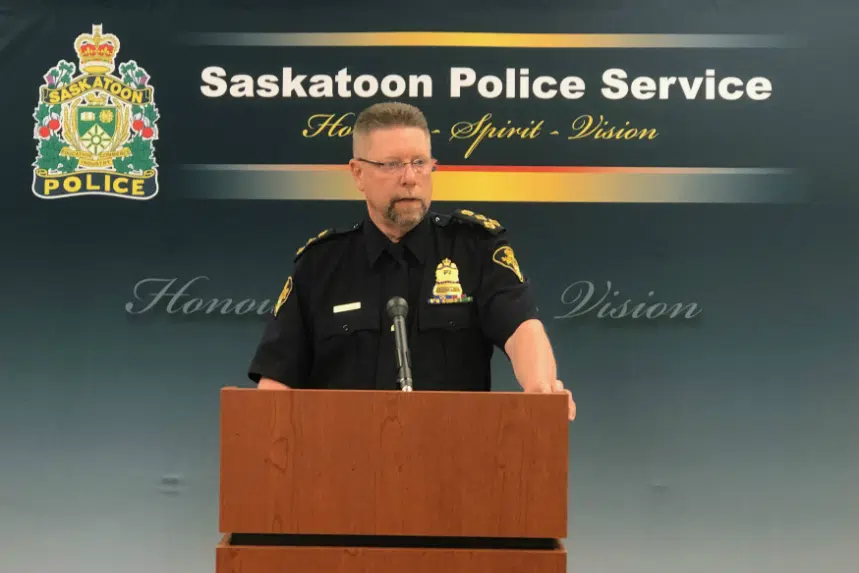Calls for service are up in Saskatoon, with around 1,000 more in September than last year, according to Saskatoon’s police chief.
Troy Cooper shared information on the latest crime statistics in Saskatoon with Gormley.
During this time of year, that’s unusual, Cooper commented. Typically, with back to school and cooler weather keeping people inside more, there are fewer crimes of opportunity. In 2020, however, there was an overall increase over the five-year average in calls for service. That number got even worse this year.
He said a lot of the calls aren’t crime-related and instead more centred around social issues like addictions and opioids.
Factors behind these developments include COVID and its impact on economic standings. Cooper said people are being pushed into more marginalized situations as a result of finances complicated by the pandemic.
“There’s more … visible evidence, I think, of that sort of thing in our community,” he said.
Cooper said fentanyl is being seen more in Saskatoon. Overdose calls tend to require both health and police responses. Officers will usually deliver naloxone between 10 and 12 times in a year. In 2021, that number is already as high as 23.
“We’re on track for some sad statistics in 2021,” Cooper predicted.
He said issues of addictions to drugs and alcohol can also translate into property crime and violent crime.
Public health orders
Public health concerns aren’t contributing overly to the rise in calls for service, however.
Cooper said the newest public health development in the province requiring many businesses to request proof of vaccination hasn’t translated into calls to police.
“A lot of obligations around enforcement and compliance are turned into the community,” Cooper explained, saying vendors are now responsible for enforcing public health measures.
“I think there’s rising tensions there,” he noted, but added people in every workplace will have different views and opinions. The role of the employer, however, is to do their best to make sure people are treated well.
“At the end of the day, there’s a rule, there’s a regulation and a health order we have to respect.”
He foresees indoor mask mandates becoming more of an issue as winter approaches in the province, but said this is again an issue that will affect vendors more than police.
The Saskatoon Police Service will work with the Saskatchewan Public Safety Agency and public health officials to make sure vendors are supported and understand the rules they are required to enforce.
Updates on PPC election night rally, restaurant proof-of-vaccination incident
Cooper also provided updates on some previously reported investigations.
He said the PPC rally on Sept. 20 is still under investigation and differed from other public health incidents because it was something widespread police were called to. He said the case will come to a resolution.
Addressing the issue at a Saskatoon restaurant that took place over the weekend, Cooper said charges aren’t always laid immediately.
“Whether it’s a replica firearm or an actual firearm, if somebody’s concealing them, there would be a charge,” he explained in response to a listener’s question.
The investigation into that incident is also ongoing.
Fraud and scams
During COVID isolation periods, Cooper said police saw an increase in fraudulent activity online and email-based scams.
Those sorts of crimes have decreased this year but a return to more traditional scams — over the phone, for example — have made a bit of a comeback.
Cooper said callers claiming to represent the Canada Revenue Agency or the Canada Border Services Agency are becoming more common again, where callers are demanded to make a payment to mitigate consequences like an outstanding warrant or alleged criminal charges.
“These are traditional frauds and we’re just asking people to be careful with that,” Cooper said. “There’s no legitimate federal or provincial agency that’s going to call you at home and threaten you with a charge or ask you to supply money in that way.”
If concerned about whether a call is real, Cooper said residents can call police for clarification.
General crime stats
Overall, crime statistics have remained fairly steady and similar to those reported last year.
Cooper said violent crime has been less extreme this year, with about the same number of homicides, but an increase has been seen in overall assaults. That’s part of a trend seen over the past number of years, he explained, and something police are trying to address through realigning priorities and resourcing.
The assaults include those on police officers, assaults with weapons and aggravated assaults, which have seen a year-over-year increase.
With 2020 an unusual year because so many people were kept at home because of COVID-19 regulations, Cooper said usual data analysis done by police has been somewhat disrupted.
Reductions in arson have been noted, and police have been able to complete more roadside enforcement since COVID restrictions remain largely lifted in the province. That means drivers can expect to see more police on the roads and roadsides.
With October presenting a focus on distracted driving through a partnership with SGI, Cooper said more officers will be out doing education and enforcement on the roadside about the dangers of driving without full focus on the road.
Officer vaccination policy
When asked about vaccination policies in place for his service, Cooper said every employee who is not double vaccinated is required to have weekly rapid tests.
These tests are completed at the beginning of their shifts, after staff or officers return from days off.
“I think it comforts the community to know that the officers that are out there have been tested or have been vaccinated,” Cooper explained.
He added the procedure has been helpful in identifying asymptomatic members of their staff.







